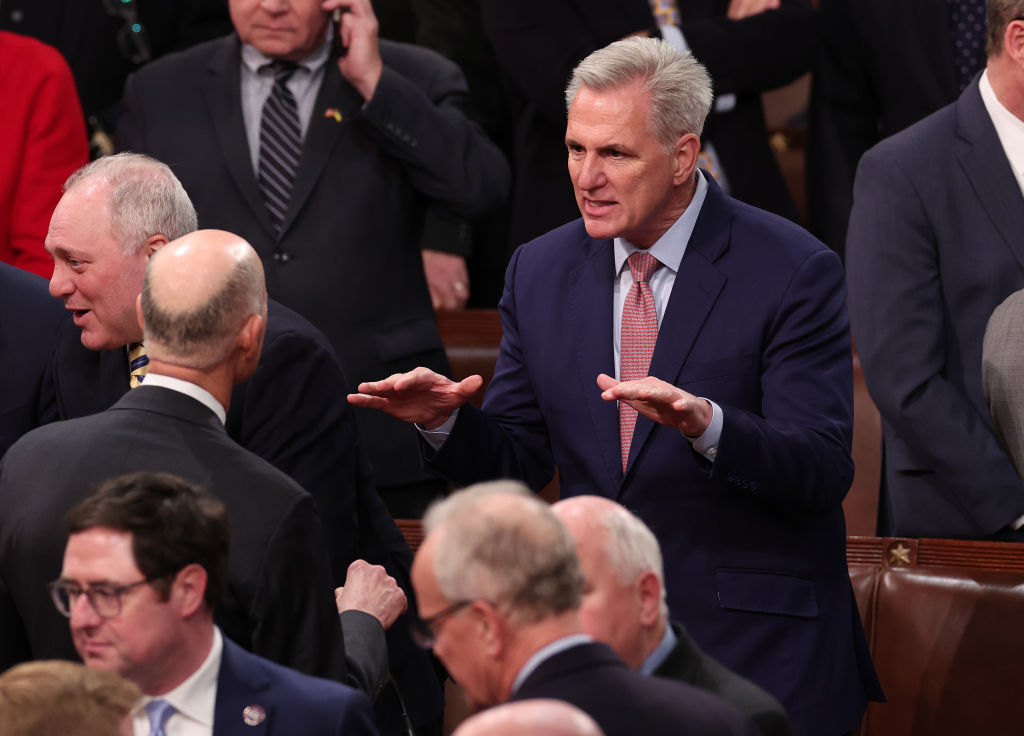Good morning. The 118th Congress begins today, and it could kick off with chaos.
Republicans’ first order of business will be an attempt to elect a speaker when the chamber convenes around noon.
The House speaker directs the chamber’s agenda and is second in the presidential line of succession. With several far-right holdouts opposing GOP Leader Kevin McCarthy’s bid for the job, the process may require behind-the-scenes wrangling and multiple ballots.
That would be historic. It has been a century since a speakership race has needed more than one round of voting. McCarthy has pledged to hold on as long as it takes to win the speaker’s gavel, but if the math doesn’t add up for him members may begin to pitch alternatives. As they gear up for today’s proceedings, lawmakers and staff agree on this: How the race will unfold on the floor—and who will ultimately become speaker—is anyone’s guess.
In this edition of Uphill, we’ll take a look at some of the biggest unanswered questions about the speakership race.
Will everyone show up and vote for a candidate?
To become speaker, McCarthy needs a majority of all members attending the vote and supporting a candidate by name. If all elected members show up and vote for a candidate—via an alphabetical roll call that could take an hour or more to get through each member—it would require 218 votes to win the speakership. The threshold can change, depending on absences and if any members vote “present” rather than in favor of a candidate.
There’s already one vacancy: Virginia Democratic Rep. Donald McEachin died late last year, leaving the number of elected members at 434. The math still results in a 218-vote threshold for the speakership race, but any one additional absence or “present” vote today would lower the threshold to 217.
Beyond that, for every two absences or “present” votes, the threshold to win the speakership drops by one vote.
If McCarthy can convince some of his detractors to vote “present,” he still ultimately needs to win more votes than Democratic Leader Hakeem Jeffries. That’s why Matt Glassman, a senior fellow at Georgetown University’s Government Affairs Institute, noted absences and “present” votes only help McCarthy if they come from Democrats or his far-right critics.
But Democrats are unlikely to be of help: Jeffries told reporters Monday he expects all his members to attend the vote and doesn’t know of any who plan to vote “present.”
Just how many ‘no’ votes are there?
Republicans’ thin majority gives McCarthy little room for dissent: A 218-vote threshold means he can only afford to lose only four members of his conference. He’s already starting out with more opponents than that—and it’s not entirely clear how many more he has to persuade beyond the ones who have made their opposition public.
Five Republicans have said they will vote against McCarthy: Reps. Andy Biggs, Bob Good, Ralph Norman, Matt Gaetz, and Matt Rosendale. But nine others have complained that McCarthy has not specifically addressed their concerns about opening up the House legislative process and staying out of primaries.
By saying he’ll stick it out for multiple ballots McCarthy is trying to call their bluff. His supporters argue Republicans should unite quickly so they can move on to legislation and form committees sooner.
But much depends on how determined McCarthy’s opponents are. Will they be worn down by a protracted process and become more open to negotiation? Or will they stick it out until someone other than McCarthy wins the gavel?
It’s not obvious. Take it from an insider: “I have no clue about how committed those who don’t trust McCarthy are,” departing Rep. Mo Brooks, a member of the far-right House Freedom Caucus, told The Dispatch Monday.
Is there anything McCarthy can trade to win over skeptics?
McCarthy has given an array of concessions to his critics in an attempt to win them over (Roll Call’s Lindsey McPherson has a helpful list). That includes making it easier for members to force a vote on ousting the speaker, limiting bills to single topics, and setting up a vote to establish a committee to investigate the government and various abuses of power.
One flashpoint keeps coming up: the motion to vacate the chair, the tool conservatives invoked in 2015 that prompted then-House Speaker John Boehner to step down. While in the majority, Democrats made it more difficult for members to bring a motion to vacate forward.
Now members of the House Freedom Caucus want to return to the earlier rule, that any one member can offer a motion to vacate.
McCarthy has resisted bringing the threshold down so much, but over the weekend he gave his critics a major win in agreeing to reduce it to a five-member threshold. But they still want to see the single-member threshold. It’s possible McCarthy could cave even more, but it’s not clear if that will be enough to win their support.
Meanwhile, much of the opposition to McCarthy centers not on procedural gripes but personal grievances. Gaetz and others don’t appreciate that McCarthy said Gaetz’ behavior in the aftermath of the January 6, 2021, attack on the Capitol put people in danger.
Others have slammed McCarthy’s reluctance to impeach President Joe Biden and his cabinet officials. Biggs has repeatedly raised fears that McCarthy will be too quick to cooperate with Democrats to fund the government and avert a debt ceiling crisis.
Some of their rhetoric would be difficult to walk back if McCarthy is able to win over his critics. “He’s part of the swamp cartel,” Rep. Bob Good, one of the five firm “no” votes, said of McCarthy this week.
What comes after the first ballot?
If members don’t rally around a speaker on the first vote, the House likely will immediately take another ballot. Leaders could negotiate with members during the vote or McCarthy could take one of several other avenues. The House could move into nominating speeches to stall for time, during which members would argue in favor of their candidates.
If McCarthy can win a majority to do it, members could also adjourn and return to the matter at a later date. Then Republicans could hash out their problems in a private conference meeting, rather than on the House floor.
Brendan Buck, who worked for the past two Republican House speakers, noted in a New York Times piece this week that moving to adjourn may prove challenging. “House Democrats are unlikely to want to aid Mr. McCarthy, while those Republicans blocking him may not want the balloting to stop.”
That’s why some members are preparing for a late night. Members won’t be sworn in—and can’t move on to legislation—until they elect a speaker. So rank-and-file Republicans will face lots of pressure to resolve the matter quickly and avert institutional disruptions such as pay freezes to committee staff.
How long can McCarthy hold on?
McCarthy has said he’ll stay in the speakership race as long as it takes for him to win the gavel.
There’s precedent for drawn-out speakership fights: In 1856, electing the speaker took two months and 133 votes. But it’s unlikely members will have the appetite to stand behind McCarthy for such a long time.
Rep. Don Bacon, a Nebraska Republican, has pledged to support McCarthy in ballot after ballot, but not indefinitely if it’s clear the McCarthy critics aren’t playing ball. At that point, he has threatened to bring forward a consensus candidate who could win some Democratic votes. That outcome is far from likely, but the sentiment underscores dynamics McCarthy may have a hard time overcoming.
If McCarthy loses on multiple ballots, members itching to move on may start pitching names like GOP Majority Leader Steve Scalise or Rep. Elise Stefanik.
Who is the mystery candidate Bob Good keeps hinting at?
McCarthy’s opponents seem to have another candidate in mind, but they’ve kept it private in recent weeks. Good has repeatedly hinted at a mystery candidate whom the group will nominate if it becomes clear McCarthy doesn’t have the votes.
“You’ll see that name tomorrow on that second ballot,” Good said Monday on Fox News.
On the Floor
If members decide on a House speaker this week, Republicans may move on to a list of bills addressing a broad variety of campaign priorities. These include legislation related to immigration, the southern border, and abortion, as well as a bill to establish a select committee on strategic competition with China. More details are available here.









Please note that we at The Dispatch hold ourselves, our work, and our commenters to a higher standard than other places on the internet. We welcome comments that foster genuine debate or discussion—including comments critical of us or our work—but responses that include ad hominem attacks on fellow Dispatch members or are intended to stoke fear and anger may be moderated.